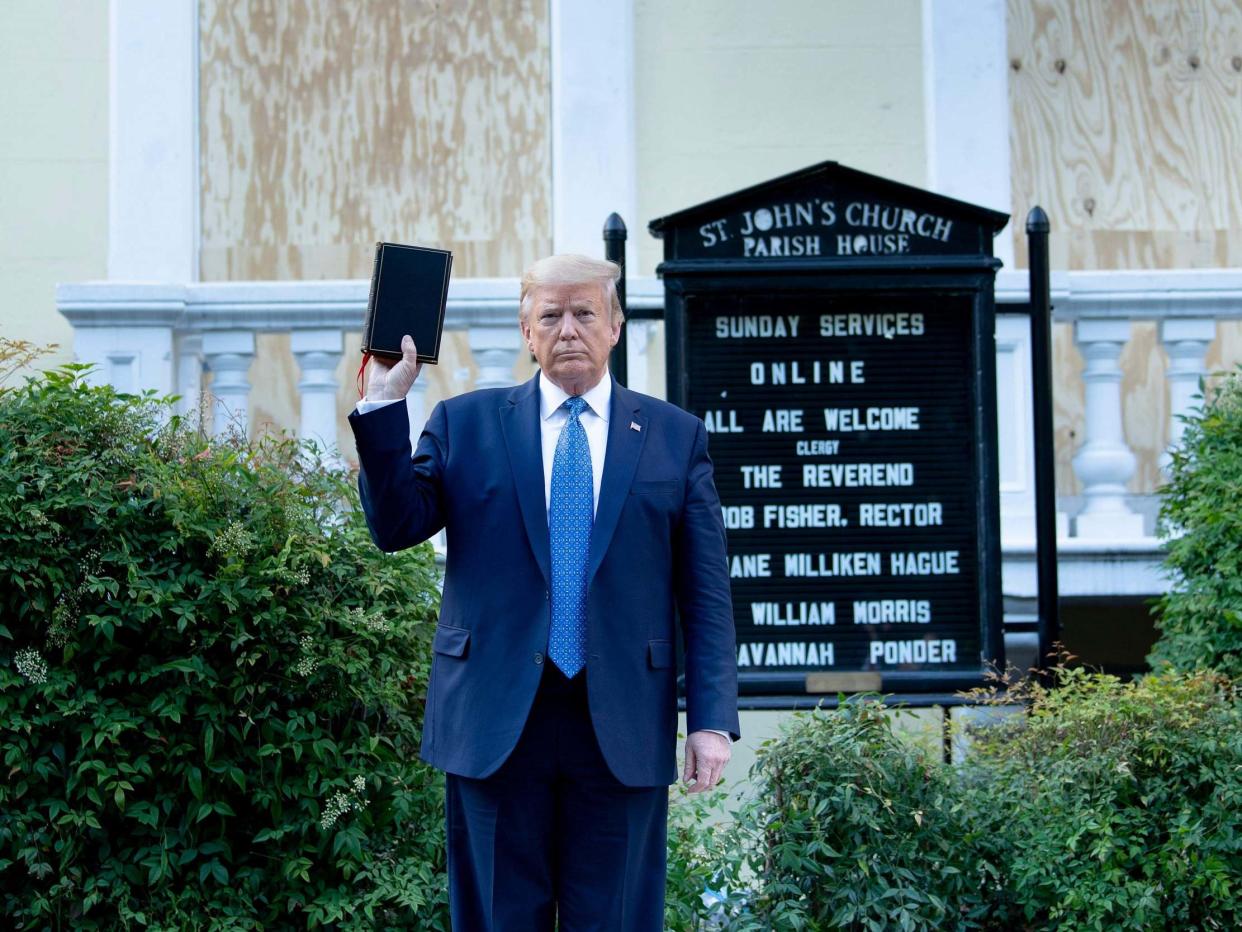Trump is a caricature of a Middle East despot – with the Bible in one hand and the military in the other. This is his message to the world

The unleashing of angry protest across the US over the last week shows how rotten society is when it comes to people of colour.
In America, demonstrations against it are a regular occurrence. Politicians and administrations on both sides of the divide are reluctant to act for two reasons: They know how deeply-entrenched it is in society, and how riddled with racism the state institutions can be. They may feel that in any serious attempt to tackle this decease rigorously, some institutions might break up.
The Iraq war in 2003 is one example that briefly unveiled what American institutional racism looks like. The real reason behind the brutal treatment of prisoners in Abu Ghraib - later described by then-secretary of defense, Donald Rumsfeld as "blatantly sadistic, cruel, and inhuman" - was that some soldiers believed Arab inmates were less than them because of their race and skin colour. The shocking photographs showed a systematic way used by some in the US military for subjugation.
The unprecedented scandal then forced Washington to transfer all prisoners out of Abu Ghraib and hand it over to the Iraqis. Eleven US soldiers were convicted of crimes relating to the scandal, but major change was lacking.
But that was in the past. Now, Donald Trump is himself enflames tensions over race. On Monday, he threatened to deploy "heavily armed" US military troops to quell the protests over the death of a black man – George Floyd – after he was arrested. Footage of the arrest shows a white police officer, Derek Chauvin – who has been charged with murder – kneeling on Mr Floyd's neck while he was pinned to the floor.
We seldom see an American president promoting such authoritarianism and violence against his citizens.
In St. John's Episcopal Church, close to the White House, Trump appeared holding the bible in a likely attempt to appeal to the Evangelicals and his right-wing vote base. Protesters were cleared by police using tear gas ahead of the president's visit.
The clearance of protesters, journalists being arrested for reporting and President Trump promoting a “when the looting starts, the shooting starts” narrative by President Trump sent a clear message to the outside world, especially despots in the Middle East.
The message is simple and straightforward: The moral authority of the American democracy that once held the liberal, rules-based conduct of the state towards its citizens is crumbling. The elationship between governments and their citizens must now be based – even in the beacon state of democracy – on order, whoever that has to come about.
Many didn't waste time celebrate this new get-out-of-jail card. Including in Egypt, home to the repressive regime of President Abdel Fattah al-Sisi.
Hundreds of fake accounts rushed to Twitter and Facebook to promote the tale that the moral supremacy of democratic societies, which forms a central legitimacy complex for dictators, has been closed. Their central argument is that the live scenes from the US of police violence and institutional racism – not “bad apples”- against peaceful protesters, many of them black, showed a system no longer fit for purpose. An Arab friend, who is not very keen on democracy, seized the moment to tell me: “Human rights end where the threat to order begins. This is what the president of the United States is telling us.”
Previous administrations have been using the promotion of democracy as a political card whenever it suited the US interests. This American hypocrisy is not new. Many in the Middle East, on both sides of the government and opposition, saw the efforts by US officials trying publicly to sell democracy as a core US interest in the region as a joke. But sometimes it has effectively held back some of the most brutal actions among US allies towards freedom of expression and political dissent.
Since Trump became president, siding with the establishment against their people in Iraq, Lebanon, Egypt and Sudan became a central foreign policy principle. This included cutting funds and shutting down offices working on promoting democracy in the White House and the State Department.
But the death of George Floyd and the violent response to the protests and journalists by police, makes for very similar images with protests in the Middle East. Although it’d be wise not to draw comparisons between the demonstrations, their driving motives and the number of victims among protesters are different, tear gas and anger are common themes.
The coronavirus pandemic will likely set the stage for major transformations in the values and images of many countries. Although the US is still a developed democracy, the swift rise of China as a superpower will blur the faultlines between democratic and authoritarian governments for some in the Middle East.
China for its side too as sought to flag up what Beijing sees as US hypocrisy over how they view the protests in Hong Kong versus what is happening across America. This is the diplomatic seeds Trump is sowing with his actions.
In threatening to deploy the US military to silence his critics and by holding up the bible during a political row, Trump is certainly reading from the Middle Eastern despot playbook. Sure his chums in the region will enjoy what they are seeing.
Read more
Bishop ‘outraged’ after Trump had protesters tear-gassed before posing
Minneapolis volunteers organise food supplies as protests close stores
Black Lives Matter protesters stage marches around the world
Trump threatens to deploy military to end George Floyd protests – live
Alabama mayor orders removal of Confederate monument amid protests


